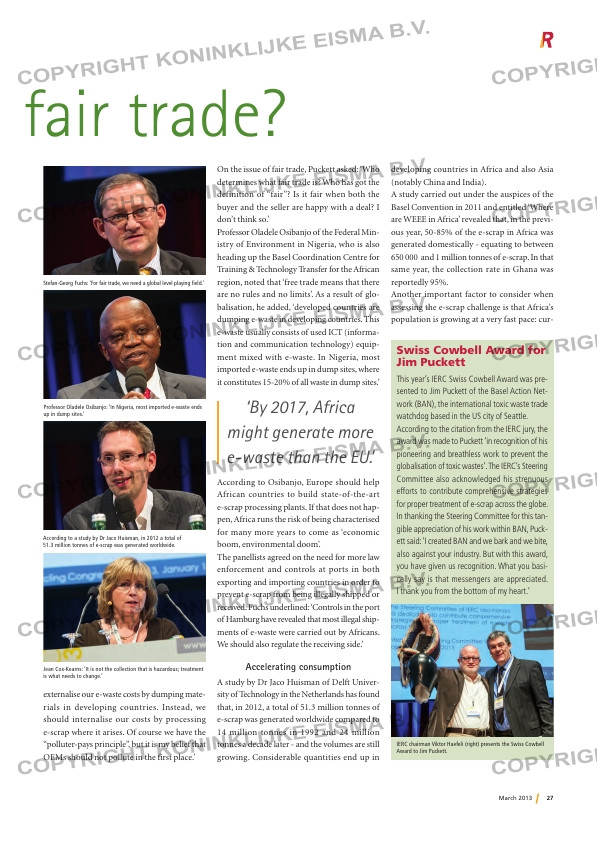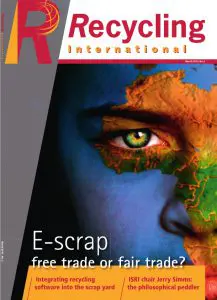Page 27 from: March 2013

27March 2013
externalise our e-waste costs by dumping mate-
rials in developing countries. Instead, we
should internalise our costs by processing
e-scrap where it arises. Of course we have the
“polluter-pays principle”, but it is my belief that
OEMs should not pollute in the first place.’
On the issue of fair trade, Puckett asked: ‘Who
determines what fair trade is? Who has got the
definition of “fair”? Is it fair when both the
buyer and the seller are happy with a deal? I
don’t think so.’
Professor Oladele Osibanjo of the Federal Min-
istry of Environment in Nigeria, who is also
heading up the Basel Coordination Centre for
Training & Technology Transfer for the African
region, noted that ‘free trade means that there
are no rules and no limits’. As a result of glo-
balisation, he added, ‘developed countries are
dumping e-waste in developing countries. This
e-waste usually consists of used ICT (informa-
tion and communication technology) equip-
ment mixed with e-waste. In Nigeria, most
imported e-waste ends up in dump sites, where
it constitutes 15-20% of all waste in dump sites.’
According to Osibanjo, Europe should help
African countries to build state-of-the-art
e-scrap processing plants. If that does not hap-
pen, Africa runs the risk of being characterised
for many more years to come as ‘economic
boom, environmental doom’.
The panellists agreed on the need for more law
enforcement and controls at ports in both
exporting and importing countries in order to
prevent e-scrap from being illegally shipped or
received. Fuchs underlined: ‘Controls in the port
of Hamburg have revealed that most illegal ship-
ments of e-waste were carried out by Africans.
We should also regulate the receiving side.’
Accelerating consumption
A study by Dr Jaco Huisman of Delft Univer-
sity of Technology in the Netherlands has found
that, in 2012, a total of 51.3 million tonnes of
e-scrap was generated worldwide compared to
14 million tonnes in 1992 and 24 million
tonnes a decade later – and the volumes are still
growing. Considerable quantities end up in
developing countries in Africa and also Asia
(notably China and India).
A study carried out under the auspices of the
Basel Convention in 2011 and entitled ‘Where
are WEEE in Africa’ revealed that, in the previ-
ous year, 50-85% of the e-scrap in Africa was
generated domestically – equating to between
650 000 and 1 million tonnes of e-scrap. In that
same year, the collection rate in Ghana was
reportedly 95%.
Another important factor to consider when
assessing the e-scrap challenge is that Africa’s
population is growing at a very fast pace: cur-
‘By 2017, Africa
might generate more
e-waste than the EU.’
Swiss Cowbell Award for
Jim Puckett
This year’s IERC Swiss Cowbell Award was pre-
sented to Jim Puckett of the Basel Action Net-
work (BAN), the international toxic waste trade
watchdog based in the US city of Seattle.
According to the citation from the IERC jury, the
award was made to Puckett ‘in recognition of his
pioneering and breathless work to prevent the
globalisation of toxic wastes’. The IERC’s Steering
Committee also acknowledged his strenuous
efforts to contribute comprehensive strategies
for proper treatment of e-scrap across the globe.
In thanking the Steering Committee for this tan-
gible appreciation of his work within BAN, Puck-
ett said: ‘I created BAN and we bark and we bite,
also against your industry. But with this award,
you have given us recognition. What you basi-
cally say is that messengers are appreciated.
I thank you from the bottom of my heart.’
IERC chairman Viktor Haefeli (right) presents the Swiss Cowbell
Award to Jim Puckett.
E-scrap free trade or fair trade?
Stefan-Georg Fuchs: ‘For fair trade, we need a global level playing field.’
Professor Oladele Osibanjo: ‘In Nigeria, most imported e-waste ends
up in dump sites.’
According to a study by Dr Jaco Huisman, in 2012 a total of
51.3 million tonnes of e-scrap was generated worldwide.
Jean Cox-Kearns: ‘It is not the collection that is hazardous; treatment
is what needs to change.’
RI_2-E-scrap.indd 27 06-03-13 14:35



